NRSG210 Essay: Domestic Violence, Factors and Impact Analysis
VerifiedAdded on 2023/06/07
|10
|2711
|111
Essay
AI Summary
This essay examines the multifaceted issue of domestic violence, focusing on the interplay between socioeconomic and psychological factors. It begins by defining domestic violence and highlighting its global impact on victims' physical, mental, social, and reproductive health. The essay explores how socioeconomic factors like poverty, low education, and unemployment can increase the risk of domestic violence for both victims and perpetrators. It also delves into psychological factors, including childhood exposure to violence, psychological trauma, stress, fear, and control, and their impact on mental health and well-being. The essay discusses theoretical perspectives such as feminist theory, which emphasizes the role of patriarchal structures and gender inequality. It further analyzes the consequences of domestic violence, such as substance abuse and suicidal ideation, and emphasizes the need for social support and early intervention programs to mitigate the negative effects of domestic violence on individuals and communities. The essay references international and Australian sources to provide a comprehensive understanding of the issue and its implications.
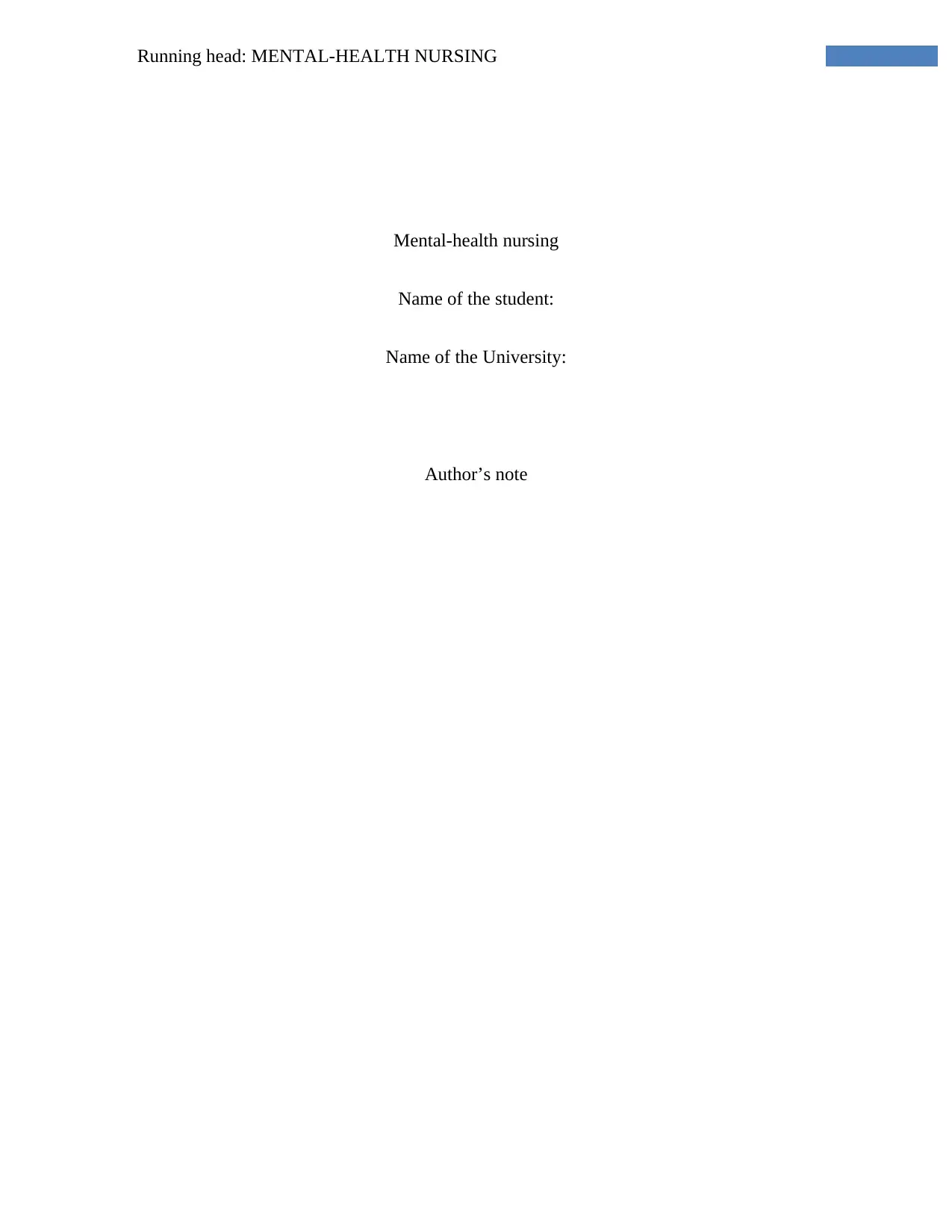
Running head: MENTAL-HEALTH NURSING
Mental-health nursing
Name of the student:
Name of the University:
Author’s note
Mental-health nursing
Name of the student:
Name of the University:
Author’s note
Paraphrase This Document
Need a fresh take? Get an instant paraphrase of this document with our AI Paraphraser
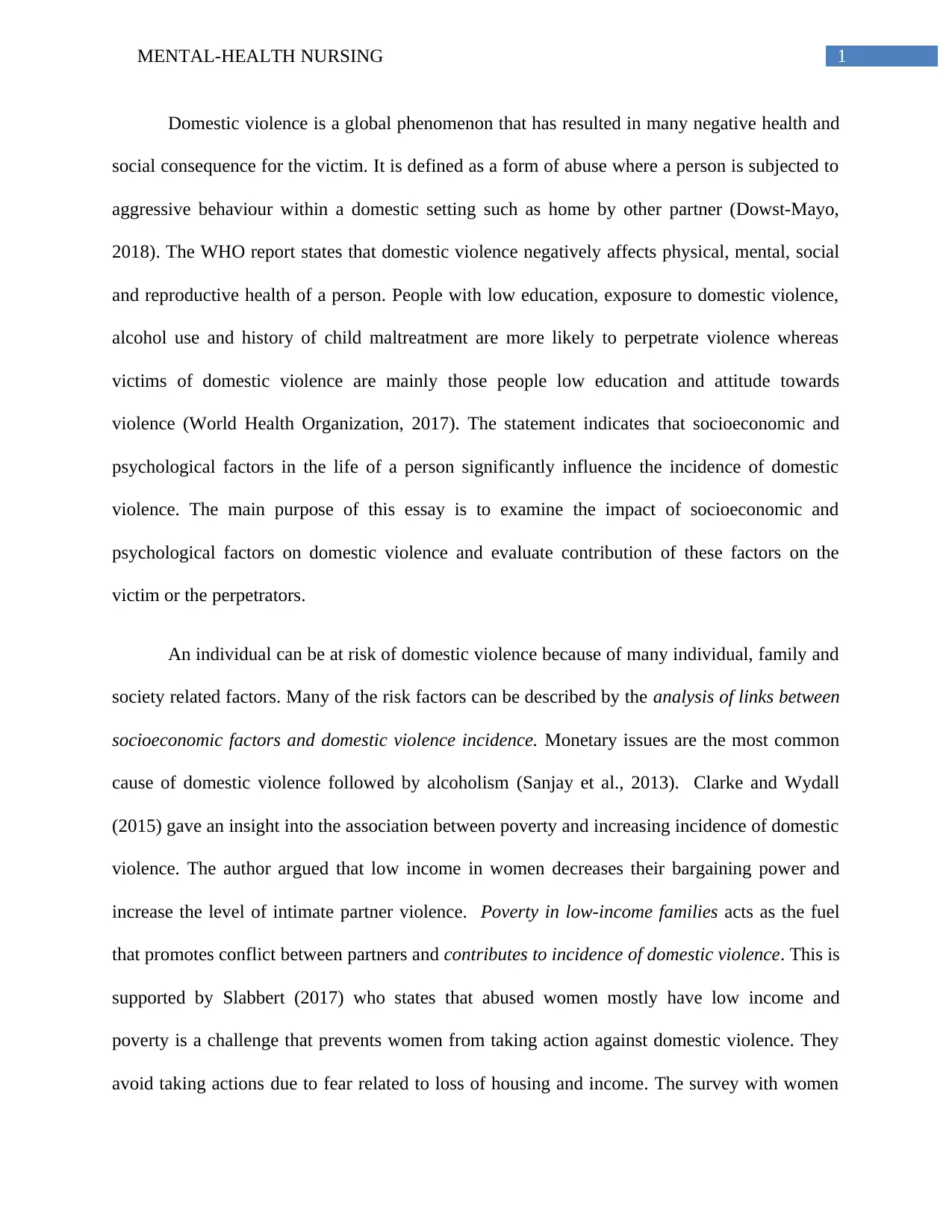
1MENTAL-HEALTH NURSING
Domestic violence is a global phenomenon that has resulted in many negative health and
social consequence for the victim. It is defined as a form of abuse where a person is subjected to
aggressive behaviour within a domestic setting such as home by other partner (Dowst-Mayo,
2018). The WHO report states that domestic violence negatively affects physical, mental, social
and reproductive health of a person. People with low education, exposure to domestic violence,
alcohol use and history of child maltreatment are more likely to perpetrate violence whereas
victims of domestic violence are mainly those people low education and attitude towards
violence (World Health Organization, 2017). The statement indicates that socioeconomic and
psychological factors in the life of a person significantly influence the incidence of domestic
violence. The main purpose of this essay is to examine the impact of socioeconomic and
psychological factors on domestic violence and evaluate contribution of these factors on the
victim or the perpetrators.
An individual can be at risk of domestic violence because of many individual, family and
society related factors. Many of the risk factors can be described by the analysis of links between
socioeconomic factors and domestic violence incidence. Monetary issues are the most common
cause of domestic violence followed by alcoholism (Sanjay et al., 2013). Clarke and Wydall
(2015) gave an insight into the association between poverty and increasing incidence of domestic
violence. The author argued that low income in women decreases their bargaining power and
increase the level of intimate partner violence. Poverty in low-income families acts as the fuel
that promotes conflict between partners and contributes to incidence of domestic violence. This is
supported by Slabbert (2017) who states that abused women mostly have low income and
poverty is a challenge that prevents women from taking action against domestic violence. They
avoid taking actions due to fear related to loss of housing and income. The survey with women
Domestic violence is a global phenomenon that has resulted in many negative health and
social consequence for the victim. It is defined as a form of abuse where a person is subjected to
aggressive behaviour within a domestic setting such as home by other partner (Dowst-Mayo,
2018). The WHO report states that domestic violence negatively affects physical, mental, social
and reproductive health of a person. People with low education, exposure to domestic violence,
alcohol use and history of child maltreatment are more likely to perpetrate violence whereas
victims of domestic violence are mainly those people low education and attitude towards
violence (World Health Organization, 2017). The statement indicates that socioeconomic and
psychological factors in the life of a person significantly influence the incidence of domestic
violence. The main purpose of this essay is to examine the impact of socioeconomic and
psychological factors on domestic violence and evaluate contribution of these factors on the
victim or the perpetrators.
An individual can be at risk of domestic violence because of many individual, family and
society related factors. Many of the risk factors can be described by the analysis of links between
socioeconomic factors and domestic violence incidence. Monetary issues are the most common
cause of domestic violence followed by alcoholism (Sanjay et al., 2013). Clarke and Wydall
(2015) gave an insight into the association between poverty and increasing incidence of domestic
violence. The author argued that low income in women decreases their bargaining power and
increase the level of intimate partner violence. Poverty in low-income families acts as the fuel
that promotes conflict between partners and contributes to incidence of domestic violence. This is
supported by Slabbert (2017) who states that abused women mostly have low income and
poverty is a challenge that prevents women from taking action against domestic violence. They
avoid taking actions due to fear related to loss of housing and income. The survey with women
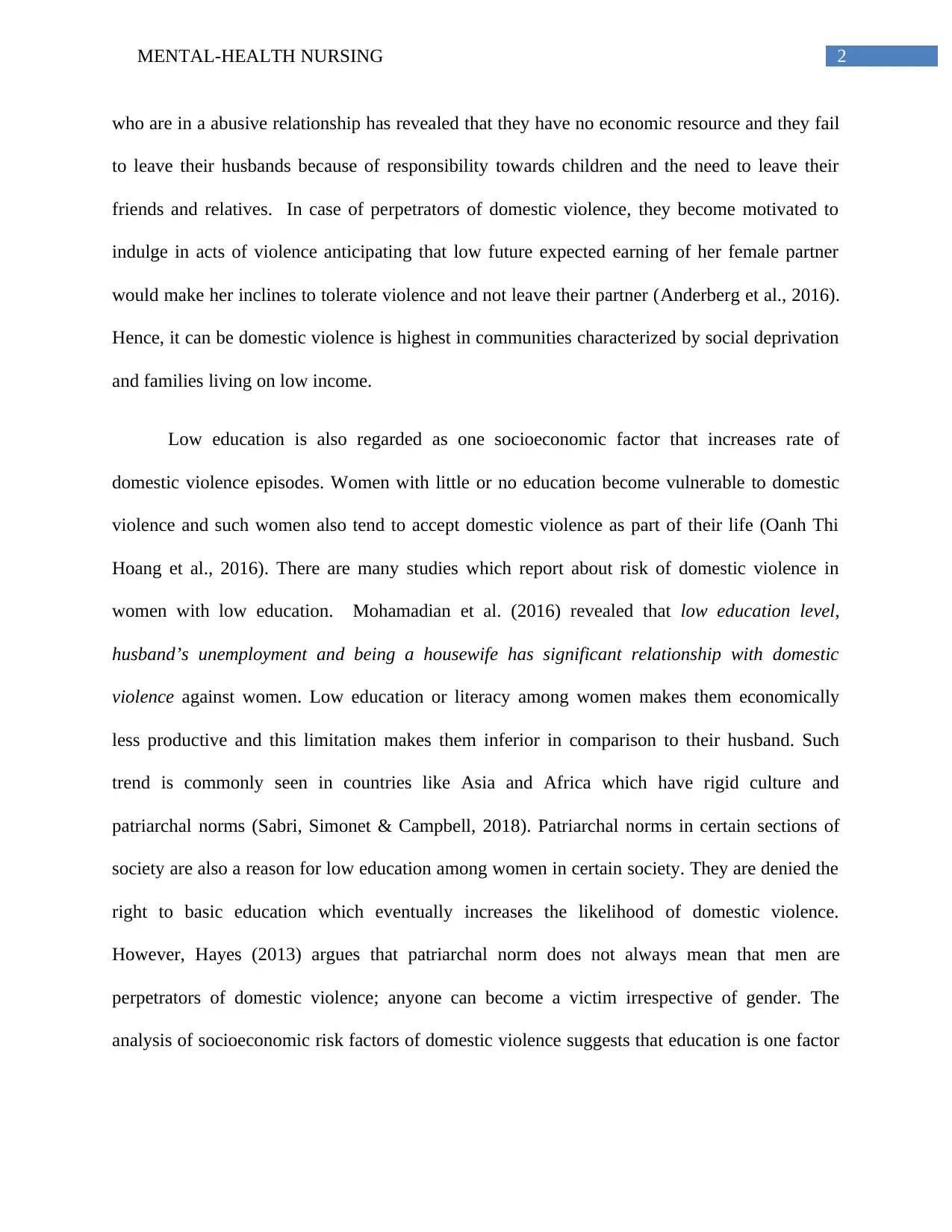
2MENTAL-HEALTH NURSING
who are in a abusive relationship has revealed that they have no economic resource and they fail
to leave their husbands because of responsibility towards children and the need to leave their
friends and relatives. In case of perpetrators of domestic violence, they become motivated to
indulge in acts of violence anticipating that low future expected earning of her female partner
would make her inclines to tolerate violence and not leave their partner (Anderberg et al., 2016).
Hence, it can be domestic violence is highest in communities characterized by social deprivation
and families living on low income.
Low education is also regarded as one socioeconomic factor that increases rate of
domestic violence episodes. Women with little or no education become vulnerable to domestic
violence and such women also tend to accept domestic violence as part of their life (Oanh Thi
Hoang et al., 2016). There are many studies which report about risk of domestic violence in
women with low education. Mohamadian et al. (2016) revealed that low education level,
husband’s unemployment and being a housewife has significant relationship with domestic
violence against women. Low education or literacy among women makes them economically
less productive and this limitation makes them inferior in comparison to their husband. Such
trend is commonly seen in countries like Asia and Africa which have rigid culture and
patriarchal norms (Sabri, Simonet & Campbell, 2018). Patriarchal norms in certain sections of
society are also a reason for low education among women in certain society. They are denied the
right to basic education which eventually increases the likelihood of domestic violence.
However, Hayes (2013) argues that patriarchal norm does not always mean that men are
perpetrators of domestic violence; anyone can become a victim irrespective of gender. The
analysis of socioeconomic risk factors of domestic violence suggests that education is one factor
who are in a abusive relationship has revealed that they have no economic resource and they fail
to leave their husbands because of responsibility towards children and the need to leave their
friends and relatives. In case of perpetrators of domestic violence, they become motivated to
indulge in acts of violence anticipating that low future expected earning of her female partner
would make her inclines to tolerate violence and not leave their partner (Anderberg et al., 2016).
Hence, it can be domestic violence is highest in communities characterized by social deprivation
and families living on low income.
Low education is also regarded as one socioeconomic factor that increases rate of
domestic violence episodes. Women with little or no education become vulnerable to domestic
violence and such women also tend to accept domestic violence as part of their life (Oanh Thi
Hoang et al., 2016). There are many studies which report about risk of domestic violence in
women with low education. Mohamadian et al. (2016) revealed that low education level,
husband’s unemployment and being a housewife has significant relationship with domestic
violence against women. Low education or literacy among women makes them economically
less productive and this limitation makes them inferior in comparison to their husband. Such
trend is commonly seen in countries like Asia and Africa which have rigid culture and
patriarchal norms (Sabri, Simonet & Campbell, 2018). Patriarchal norms in certain sections of
society are also a reason for low education among women in certain society. They are denied the
right to basic education which eventually increases the likelihood of domestic violence.
However, Hayes (2013) argues that patriarchal norm does not always mean that men are
perpetrators of domestic violence; anyone can become a victim irrespective of gender. The
analysis of socioeconomic risk factors of domestic violence suggests that education is one factor
⊘ This is a preview!⊘
Do you want full access?
Subscribe today to unlock all pages.

Trusted by 1+ million students worldwide
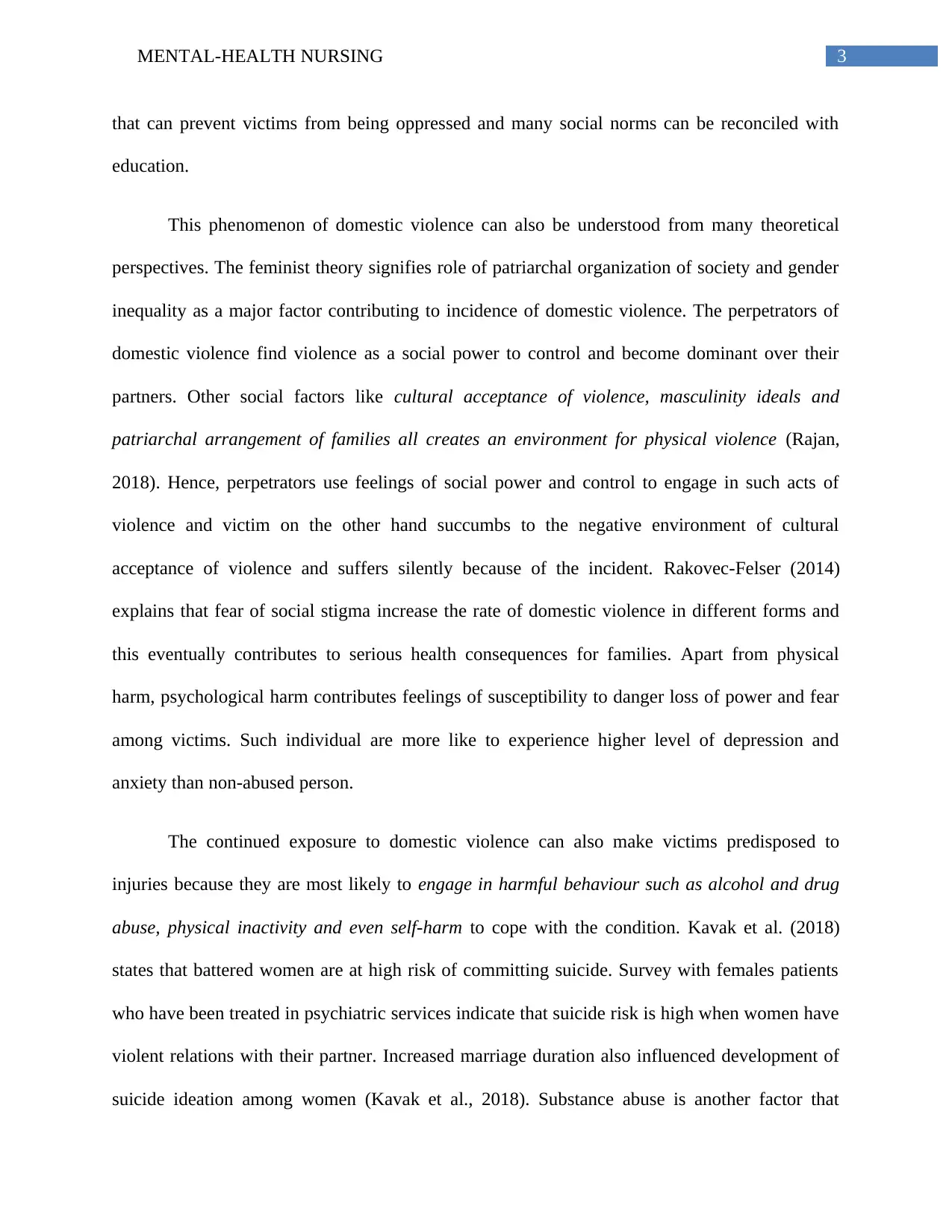
3MENTAL-HEALTH NURSING
that can prevent victims from being oppressed and many social norms can be reconciled with
education.
This phenomenon of domestic violence can also be understood from many theoretical
perspectives. The feminist theory signifies role of patriarchal organization of society and gender
inequality as a major factor contributing to incidence of domestic violence. The perpetrators of
domestic violence find violence as a social power to control and become dominant over their
partners. Other social factors like cultural acceptance of violence, masculinity ideals and
patriarchal arrangement of families all creates an environment for physical violence (Rajan,
2018). Hence, perpetrators use feelings of social power and control to engage in such acts of
violence and victim on the other hand succumbs to the negative environment of cultural
acceptance of violence and suffers silently because of the incident. Rakovec-Felser (2014)
explains that fear of social stigma increase the rate of domestic violence in different forms and
this eventually contributes to serious health consequences for families. Apart from physical
harm, psychological harm contributes feelings of susceptibility to danger loss of power and fear
among victims. Such individual are more like to experience higher level of depression and
anxiety than non-abused person.
The continued exposure to domestic violence can also make victims predisposed to
injuries because they are most likely to engage in harmful behaviour such as alcohol and drug
abuse, physical inactivity and even self-harm to cope with the condition. Kavak et al. (2018)
states that battered women are at high risk of committing suicide. Survey with females patients
who have been treated in psychiatric services indicate that suicide risk is high when women have
violent relations with their partner. Increased marriage duration also influenced development of
suicide ideation among women (Kavak et al., 2018). Substance abuse is another factor that
that can prevent victims from being oppressed and many social norms can be reconciled with
education.
This phenomenon of domestic violence can also be understood from many theoretical
perspectives. The feminist theory signifies role of patriarchal organization of society and gender
inequality as a major factor contributing to incidence of domestic violence. The perpetrators of
domestic violence find violence as a social power to control and become dominant over their
partners. Other social factors like cultural acceptance of violence, masculinity ideals and
patriarchal arrangement of families all creates an environment for physical violence (Rajan,
2018). Hence, perpetrators use feelings of social power and control to engage in such acts of
violence and victim on the other hand succumbs to the negative environment of cultural
acceptance of violence and suffers silently because of the incident. Rakovec-Felser (2014)
explains that fear of social stigma increase the rate of domestic violence in different forms and
this eventually contributes to serious health consequences for families. Apart from physical
harm, psychological harm contributes feelings of susceptibility to danger loss of power and fear
among victims. Such individual are more like to experience higher level of depression and
anxiety than non-abused person.
The continued exposure to domestic violence can also make victims predisposed to
injuries because they are most likely to engage in harmful behaviour such as alcohol and drug
abuse, physical inactivity and even self-harm to cope with the condition. Kavak et al. (2018)
states that battered women are at high risk of committing suicide. Survey with females patients
who have been treated in psychiatric services indicate that suicide risk is high when women have
violent relations with their partner. Increased marriage duration also influenced development of
suicide ideation among women (Kavak et al., 2018). Substance abuse is another factor that
Paraphrase This Document
Need a fresh take? Get an instant paraphrase of this document with our AI Paraphraser
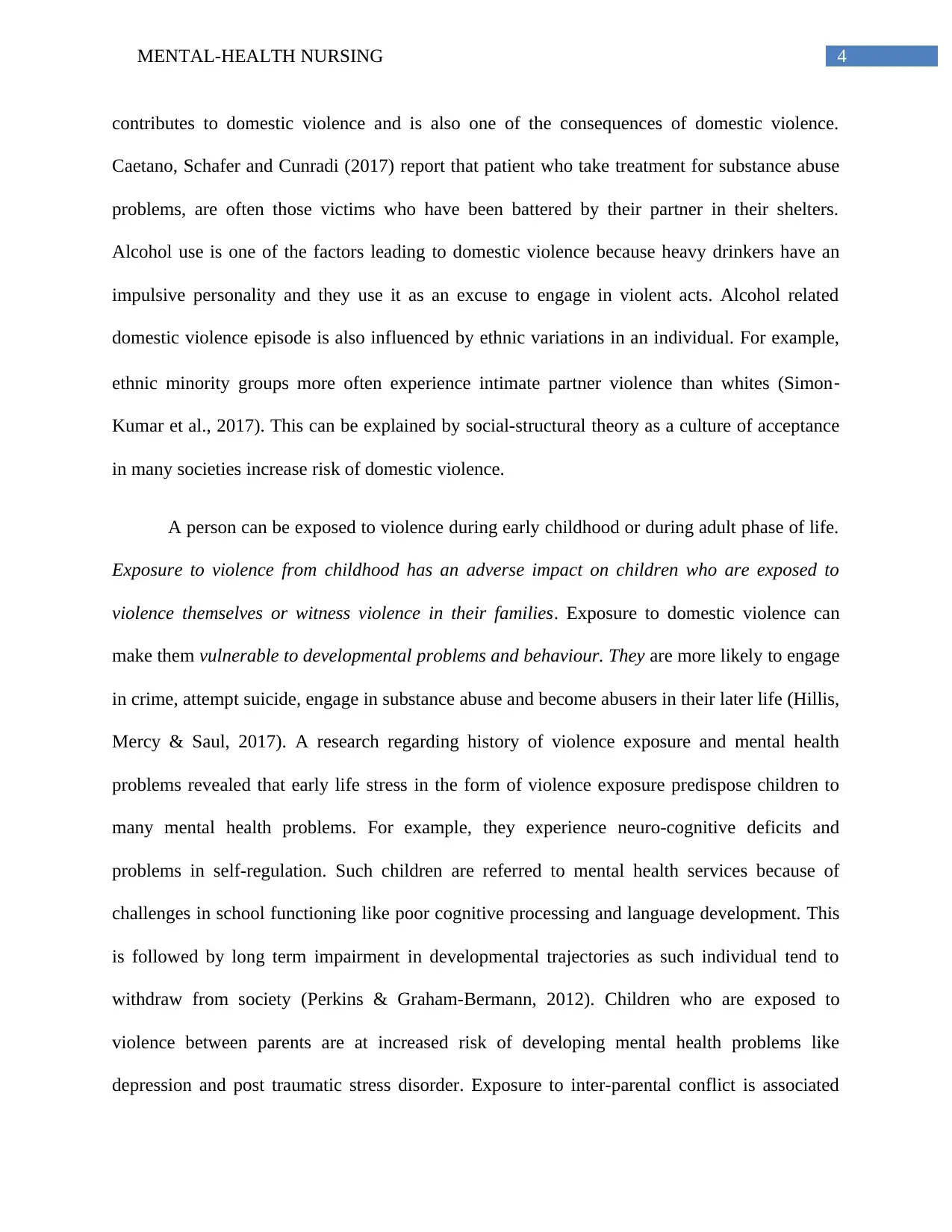
4MENTAL-HEALTH NURSING
contributes to domestic violence and is also one of the consequences of domestic violence.
Caetano, Schafer and Cunradi (2017) report that patient who take treatment for substance abuse
problems, are often those victims who have been battered by their partner in their shelters.
Alcohol use is one of the factors leading to domestic violence because heavy drinkers have an
impulsive personality and they use it as an excuse to engage in violent acts. Alcohol related
domestic violence episode is also influenced by ethnic variations in an individual. For example,
ethnic minority groups more often experience intimate partner violence than whites (Simon‐
Kumar et al., 2017). This can be explained by social-structural theory as a culture of acceptance
in many societies increase risk of domestic violence.
A person can be exposed to violence during early childhood or during adult phase of life.
Exposure to violence from childhood has an adverse impact on children who are exposed to
violence themselves or witness violence in their families. Exposure to domestic violence can
make them vulnerable to developmental problems and behaviour. They are more likely to engage
in crime, attempt suicide, engage in substance abuse and become abusers in their later life (Hillis,
Mercy & Saul, 2017). A research regarding history of violence exposure and mental health
problems revealed that early life stress in the form of violence exposure predispose children to
many mental health problems. For example, they experience neuro-cognitive deficits and
problems in self-regulation. Such children are referred to mental health services because of
challenges in school functioning like poor cognitive processing and language development. This
is followed by long term impairment in developmental trajectories as such individual tend to
withdraw from society (Perkins & Graham-Bermann, 2012). Children who are exposed to
violence between parents are at increased risk of developing mental health problems like
depression and post traumatic stress disorder. Exposure to inter-parental conflict is associated
contributes to domestic violence and is also one of the consequences of domestic violence.
Caetano, Schafer and Cunradi (2017) report that patient who take treatment for substance abuse
problems, are often those victims who have been battered by their partner in their shelters.
Alcohol use is one of the factors leading to domestic violence because heavy drinkers have an
impulsive personality and they use it as an excuse to engage in violent acts. Alcohol related
domestic violence episode is also influenced by ethnic variations in an individual. For example,
ethnic minority groups more often experience intimate partner violence than whites (Simon‐
Kumar et al., 2017). This can be explained by social-structural theory as a culture of acceptance
in many societies increase risk of domestic violence.
A person can be exposed to violence during early childhood or during adult phase of life.
Exposure to violence from childhood has an adverse impact on children who are exposed to
violence themselves or witness violence in their families. Exposure to domestic violence can
make them vulnerable to developmental problems and behaviour. They are more likely to engage
in crime, attempt suicide, engage in substance abuse and become abusers in their later life (Hillis,
Mercy & Saul, 2017). A research regarding history of violence exposure and mental health
problems revealed that early life stress in the form of violence exposure predispose children to
many mental health problems. For example, they experience neuro-cognitive deficits and
problems in self-regulation. Such children are referred to mental health services because of
challenges in school functioning like poor cognitive processing and language development. This
is followed by long term impairment in developmental trajectories as such individual tend to
withdraw from society (Perkins & Graham-Bermann, 2012). Children who are exposed to
violence between parents are at increased risk of developing mental health problems like
depression and post traumatic stress disorder. Exposure to inter-parental conflict is associated
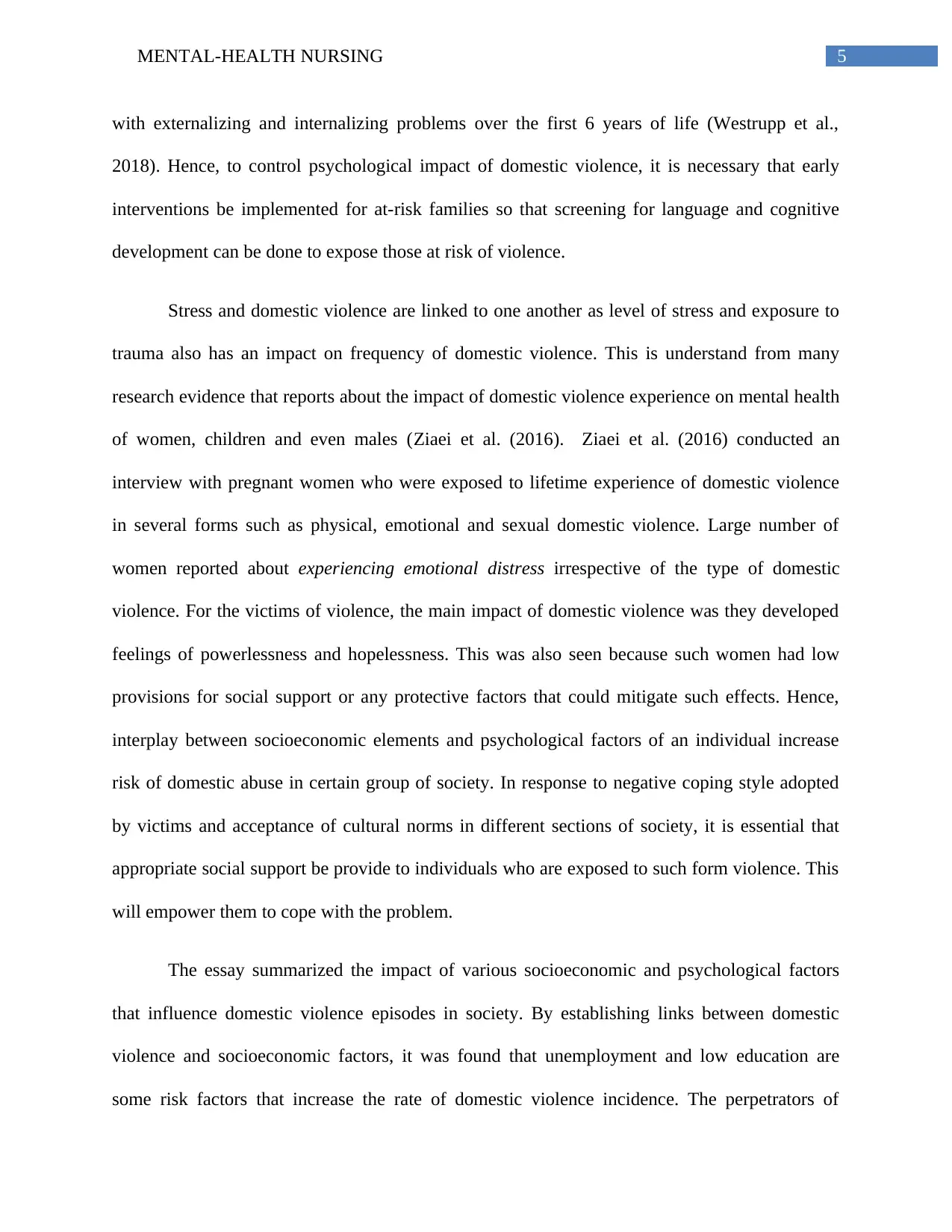
5MENTAL-HEALTH NURSING
with externalizing and internalizing problems over the first 6 years of life (Westrupp et al.,
2018). Hence, to control psychological impact of domestic violence, it is necessary that early
interventions be implemented for at-risk families so that screening for language and cognitive
development can be done to expose those at risk of violence.
Stress and domestic violence are linked to one another as level of stress and exposure to
trauma also has an impact on frequency of domestic violence. This is understand from many
research evidence that reports about the impact of domestic violence experience on mental health
of women, children and even males (Ziaei et al. (2016). Ziaei et al. (2016) conducted an
interview with pregnant women who were exposed to lifetime experience of domestic violence
in several forms such as physical, emotional and sexual domestic violence. Large number of
women reported about experiencing emotional distress irrespective of the type of domestic
violence. For the victims of violence, the main impact of domestic violence was they developed
feelings of powerlessness and hopelessness. This was also seen because such women had low
provisions for social support or any protective factors that could mitigate such effects. Hence,
interplay between socioeconomic elements and psychological factors of an individual increase
risk of domestic abuse in certain group of society. In response to negative coping style adopted
by victims and acceptance of cultural norms in different sections of society, it is essential that
appropriate social support be provide to individuals who are exposed to such form violence. This
will empower them to cope with the problem.
The essay summarized the impact of various socioeconomic and psychological factors
that influence domestic violence episodes in society. By establishing links between domestic
violence and socioeconomic factors, it was found that unemployment and low education are
some risk factors that increase the rate of domestic violence incidence. The perpetrators of
with externalizing and internalizing problems over the first 6 years of life (Westrupp et al.,
2018). Hence, to control psychological impact of domestic violence, it is necessary that early
interventions be implemented for at-risk families so that screening for language and cognitive
development can be done to expose those at risk of violence.
Stress and domestic violence are linked to one another as level of stress and exposure to
trauma also has an impact on frequency of domestic violence. This is understand from many
research evidence that reports about the impact of domestic violence experience on mental health
of women, children and even males (Ziaei et al. (2016). Ziaei et al. (2016) conducted an
interview with pregnant women who were exposed to lifetime experience of domestic violence
in several forms such as physical, emotional and sexual domestic violence. Large number of
women reported about experiencing emotional distress irrespective of the type of domestic
violence. For the victims of violence, the main impact of domestic violence was they developed
feelings of powerlessness and hopelessness. This was also seen because such women had low
provisions for social support or any protective factors that could mitigate such effects. Hence,
interplay between socioeconomic elements and psychological factors of an individual increase
risk of domestic abuse in certain group of society. In response to negative coping style adopted
by victims and acceptance of cultural norms in different sections of society, it is essential that
appropriate social support be provide to individuals who are exposed to such form violence. This
will empower them to cope with the problem.
The essay summarized the impact of various socioeconomic and psychological factors
that influence domestic violence episodes in society. By establishing links between domestic
violence and socioeconomic factors, it was found that unemployment and low education are
some risk factors that increase the rate of domestic violence incidence. The perpetrators of
⊘ This is a preview!⊘
Do you want full access?
Subscribe today to unlock all pages.

Trusted by 1+ million students worldwide
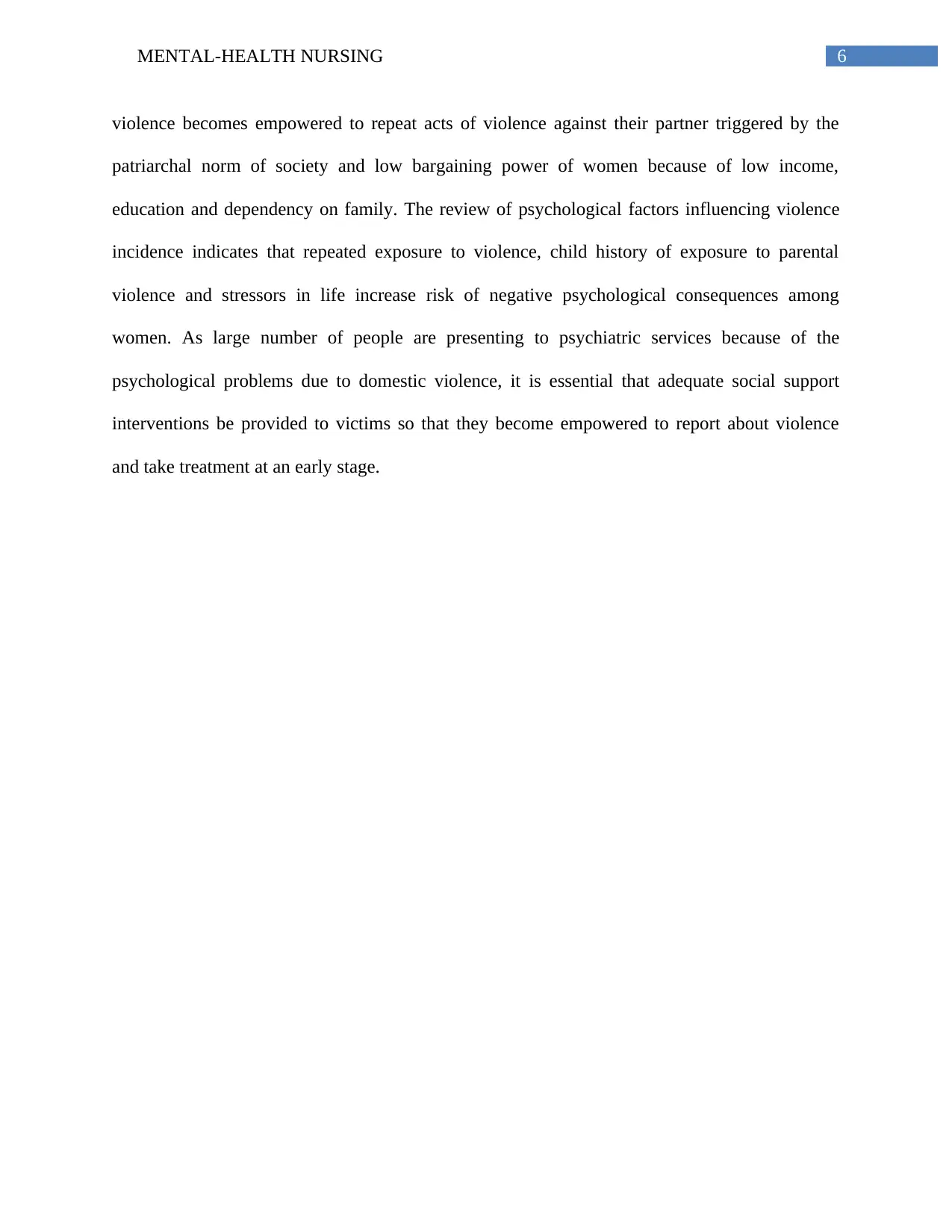
6MENTAL-HEALTH NURSING
violence becomes empowered to repeat acts of violence against their partner triggered by the
patriarchal norm of society and low bargaining power of women because of low income,
education and dependency on family. The review of psychological factors influencing violence
incidence indicates that repeated exposure to violence, child history of exposure to parental
violence and stressors in life increase risk of negative psychological consequences among
women. As large number of people are presenting to psychiatric services because of the
psychological problems due to domestic violence, it is essential that adequate social support
interventions be provided to victims so that they become empowered to report about violence
and take treatment at an early stage.
violence becomes empowered to repeat acts of violence against their partner triggered by the
patriarchal norm of society and low bargaining power of women because of low income,
education and dependency on family. The review of psychological factors influencing violence
incidence indicates that repeated exposure to violence, child history of exposure to parental
violence and stressors in life increase risk of negative psychological consequences among
women. As large number of people are presenting to psychiatric services because of the
psychological problems due to domestic violence, it is essential that adequate social support
interventions be provided to victims so that they become empowered to report about violence
and take treatment at an early stage.
Paraphrase This Document
Need a fresh take? Get an instant paraphrase of this document with our AI Paraphraser
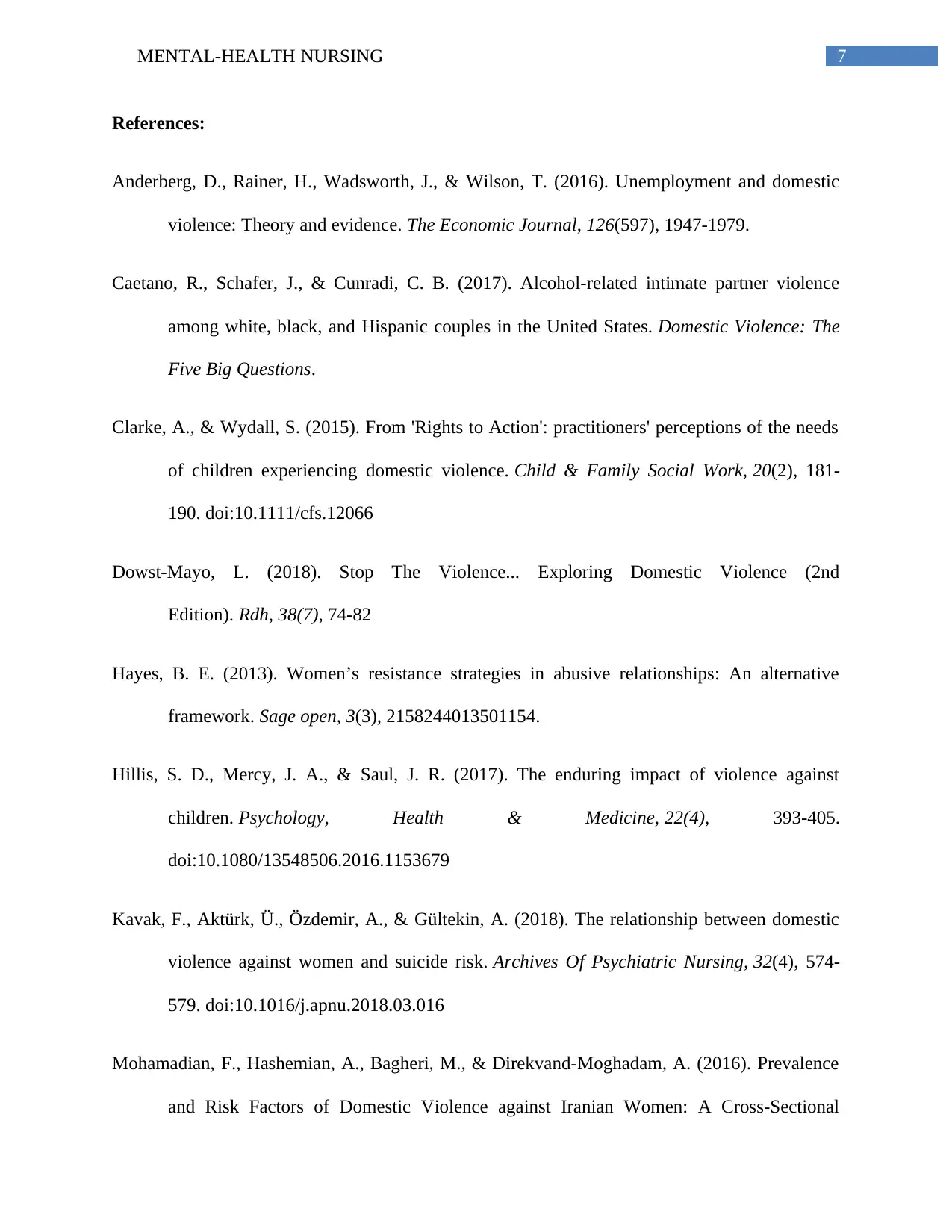
7MENTAL-HEALTH NURSING
References:
Anderberg, D., Rainer, H., Wadsworth, J., & Wilson, T. (2016). Unemployment and domestic
violence: Theory and evidence. The Economic Journal, 126(597), 1947-1979.
Caetano, R., Schafer, J., & Cunradi, C. B. (2017). Alcohol-related intimate partner violence
among white, black, and Hispanic couples in the United States. Domestic Violence: The
Five Big Questions.
Clarke, A., & Wydall, S. (2015). From 'Rights to Action': practitioners' perceptions of the needs
of children experiencing domestic violence. Child & Family Social Work, 20(2), 181-
190. doi:10.1111/cfs.12066
Dowst-Mayo, L. (2018). Stop The Violence... Exploring Domestic Violence (2nd
Edition). Rdh, 38(7), 74-82
Hayes, B. E. (2013). Women’s resistance strategies in abusive relationships: An alternative
framework. Sage open, 3(3), 2158244013501154.
Hillis, S. D., Mercy, J. A., & Saul, J. R. (2017). The enduring impact of violence against
children. Psychology, Health & Medicine, 22(4), 393-405.
doi:10.1080/13548506.2016.1153679
Kavak, F., Aktürk, Ü., Özdemir, A., & Gültekin, A. (2018). The relationship between domestic
violence against women and suicide risk. Archives Of Psychiatric Nursing, 32(4), 574-
579. doi:10.1016/j.apnu.2018.03.016
Mohamadian, F., Hashemian, A., Bagheri, M., & Direkvand-Moghadam, A. (2016). Prevalence
and Risk Factors of Domestic Violence against Iranian Women: A Cross-Sectional
References:
Anderberg, D., Rainer, H., Wadsworth, J., & Wilson, T. (2016). Unemployment and domestic
violence: Theory and evidence. The Economic Journal, 126(597), 1947-1979.
Caetano, R., Schafer, J., & Cunradi, C. B. (2017). Alcohol-related intimate partner violence
among white, black, and Hispanic couples in the United States. Domestic Violence: The
Five Big Questions.
Clarke, A., & Wydall, S. (2015). From 'Rights to Action': practitioners' perceptions of the needs
of children experiencing domestic violence. Child & Family Social Work, 20(2), 181-
190. doi:10.1111/cfs.12066
Dowst-Mayo, L. (2018). Stop The Violence... Exploring Domestic Violence (2nd
Edition). Rdh, 38(7), 74-82
Hayes, B. E. (2013). Women’s resistance strategies in abusive relationships: An alternative
framework. Sage open, 3(3), 2158244013501154.
Hillis, S. D., Mercy, J. A., & Saul, J. R. (2017). The enduring impact of violence against
children. Psychology, Health & Medicine, 22(4), 393-405.
doi:10.1080/13548506.2016.1153679
Kavak, F., Aktürk, Ü., Özdemir, A., & Gültekin, A. (2018). The relationship between domestic
violence against women and suicide risk. Archives Of Psychiatric Nursing, 32(4), 574-
579. doi:10.1016/j.apnu.2018.03.016
Mohamadian, F., Hashemian, A., Bagheri, M., & Direkvand-Moghadam, A. (2016). Prevalence
and Risk Factors of Domestic Violence against Iranian Women: A Cross-Sectional
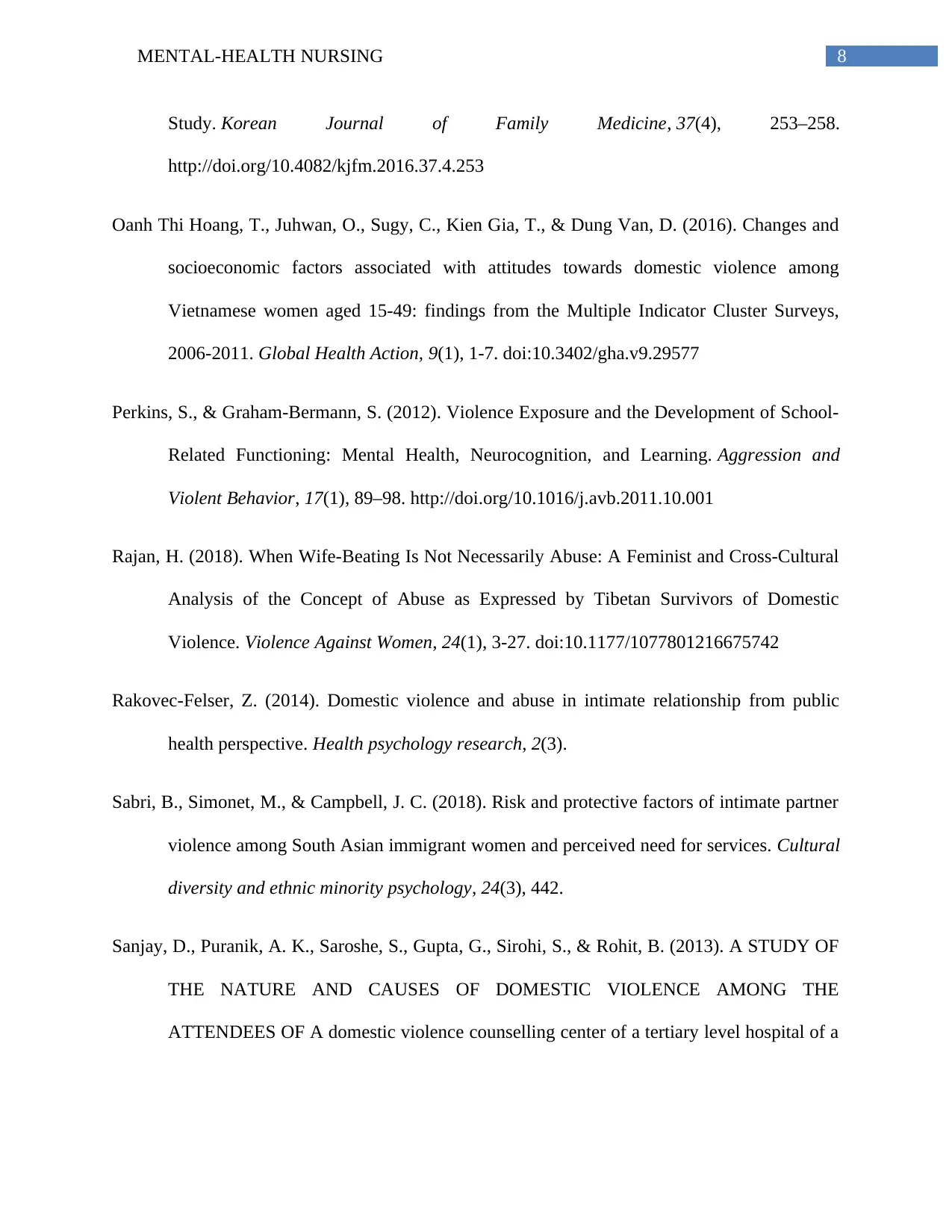
8MENTAL-HEALTH NURSING
Study. Korean Journal of Family Medicine, 37(4), 253–258.
http://doi.org/10.4082/kjfm.2016.37.4.253
Oanh Thi Hoang, T., Juhwan, O., Sugy, C., Kien Gia, T., & Dung Van, D. (2016). Changes and
socioeconomic factors associated with attitudes towards domestic violence among
Vietnamese women aged 15-49: findings from the Multiple Indicator Cluster Surveys,
2006-2011. Global Health Action, 9(1), 1-7. doi:10.3402/gha.v9.29577
Perkins, S., & Graham-Bermann, S. (2012). Violence Exposure and the Development of School-
Related Functioning: Mental Health, Neurocognition, and Learning. Aggression and
Violent Behavior, 17(1), 89–98. http://doi.org/10.1016/j.avb.2011.10.001
Rajan, H. (2018). When Wife-Beating Is Not Necessarily Abuse: A Feminist and Cross-Cultural
Analysis of the Concept of Abuse as Expressed by Tibetan Survivors of Domestic
Violence. Violence Against Women, 24(1), 3-27. doi:10.1177/1077801216675742
Rakovec-Felser, Z. (2014). Domestic violence and abuse in intimate relationship from public
health perspective. Health psychology research, 2(3).
Sabri, B., Simonet, M., & Campbell, J. C. (2018). Risk and protective factors of intimate partner
violence among South Asian immigrant women and perceived need for services. Cultural
diversity and ethnic minority psychology, 24(3), 442.
Sanjay, D., Puranik, A. K., Saroshe, S., Gupta, G., Sirohi, S., & Rohit, B. (2013). A STUDY OF
THE NATURE AND CAUSES OF DOMESTIC VIOLENCE AMONG THE
ATTENDEES OF A domestic violence counselling center of a tertiary level hospital of a
Study. Korean Journal of Family Medicine, 37(4), 253–258.
http://doi.org/10.4082/kjfm.2016.37.4.253
Oanh Thi Hoang, T., Juhwan, O., Sugy, C., Kien Gia, T., & Dung Van, D. (2016). Changes and
socioeconomic factors associated with attitudes towards domestic violence among
Vietnamese women aged 15-49: findings from the Multiple Indicator Cluster Surveys,
2006-2011. Global Health Action, 9(1), 1-7. doi:10.3402/gha.v9.29577
Perkins, S., & Graham-Bermann, S. (2012). Violence Exposure and the Development of School-
Related Functioning: Mental Health, Neurocognition, and Learning. Aggression and
Violent Behavior, 17(1), 89–98. http://doi.org/10.1016/j.avb.2011.10.001
Rajan, H. (2018). When Wife-Beating Is Not Necessarily Abuse: A Feminist and Cross-Cultural
Analysis of the Concept of Abuse as Expressed by Tibetan Survivors of Domestic
Violence. Violence Against Women, 24(1), 3-27. doi:10.1177/1077801216675742
Rakovec-Felser, Z. (2014). Domestic violence and abuse in intimate relationship from public
health perspective. Health psychology research, 2(3).
Sabri, B., Simonet, M., & Campbell, J. C. (2018). Risk and protective factors of intimate partner
violence among South Asian immigrant women and perceived need for services. Cultural
diversity and ethnic minority psychology, 24(3), 442.
Sanjay, D., Puranik, A. K., Saroshe, S., Gupta, G., Sirohi, S., & Rohit, B. (2013). A STUDY OF
THE NATURE AND CAUSES OF DOMESTIC VIOLENCE AMONG THE
ATTENDEES OF A domestic violence counselling center of a tertiary level hospital of a
⊘ This is a preview!⊘
Do you want full access?
Subscribe today to unlock all pages.

Trusted by 1+ million students worldwide
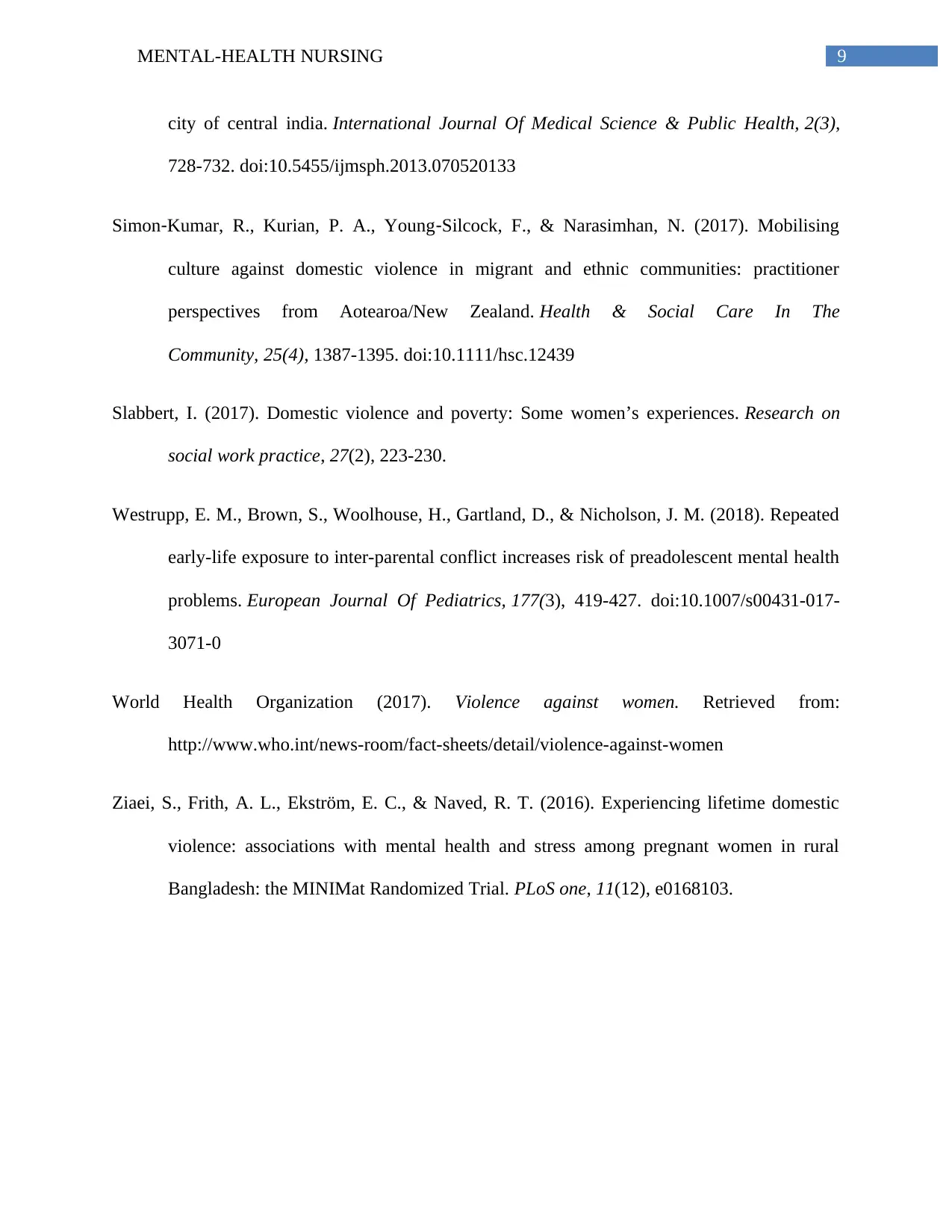
9MENTAL-HEALTH NURSING
city of central india. International Journal Of Medical Science & Public Health, 2(3),
728-732. doi:10.5455/ijmsph.2013.070520133
Simon‐Kumar, R., Kurian, P. A., Young‐Silcock, F., & Narasimhan, N. (2017). Mobilising
culture against domestic violence in migrant and ethnic communities: practitioner
perspectives from Aotearoa/New Zealand. Health & Social Care In The
Community, 25(4), 1387-1395. doi:10.1111/hsc.12439
Slabbert, I. (2017). Domestic violence and poverty: Some women’s experiences. Research on
social work practice, 27(2), 223-230.
Westrupp, E. M., Brown, S., Woolhouse, H., Gartland, D., & Nicholson, J. M. (2018). Repeated
early-life exposure to inter-parental conflict increases risk of preadolescent mental health
problems. European Journal Of Pediatrics, 177(3), 419-427. doi:10.1007/s00431-017-
3071-0
World Health Organization (2017). Violence against women. Retrieved from:
http://www.who.int/news-room/fact-sheets/detail/violence-against-women
Ziaei, S., Frith, A. L., Ekström, E. C., & Naved, R. T. (2016). Experiencing lifetime domestic
violence: associations with mental health and stress among pregnant women in rural
Bangladesh: the MINIMat Randomized Trial. PLoS one, 11(12), e0168103.
city of central india. International Journal Of Medical Science & Public Health, 2(3),
728-732. doi:10.5455/ijmsph.2013.070520133
Simon‐Kumar, R., Kurian, P. A., Young‐Silcock, F., & Narasimhan, N. (2017). Mobilising
culture against domestic violence in migrant and ethnic communities: practitioner
perspectives from Aotearoa/New Zealand. Health & Social Care In The
Community, 25(4), 1387-1395. doi:10.1111/hsc.12439
Slabbert, I. (2017). Domestic violence and poverty: Some women’s experiences. Research on
social work practice, 27(2), 223-230.
Westrupp, E. M., Brown, S., Woolhouse, H., Gartland, D., & Nicholson, J. M. (2018). Repeated
early-life exposure to inter-parental conflict increases risk of preadolescent mental health
problems. European Journal Of Pediatrics, 177(3), 419-427. doi:10.1007/s00431-017-
3071-0
World Health Organization (2017). Violence against women. Retrieved from:
http://www.who.int/news-room/fact-sheets/detail/violence-against-women
Ziaei, S., Frith, A. L., Ekström, E. C., & Naved, R. T. (2016). Experiencing lifetime domestic
violence: associations with mental health and stress among pregnant women in rural
Bangladesh: the MINIMat Randomized Trial. PLoS one, 11(12), e0168103.
1 out of 10
Related Documents
Your All-in-One AI-Powered Toolkit for Academic Success.
+13062052269
info@desklib.com
Available 24*7 on WhatsApp / Email
![[object Object]](/_next/static/media/star-bottom.7253800d.svg)
Unlock your academic potential
Copyright © 2020–2026 A2Z Services. All Rights Reserved. Developed and managed by ZUCOL.




